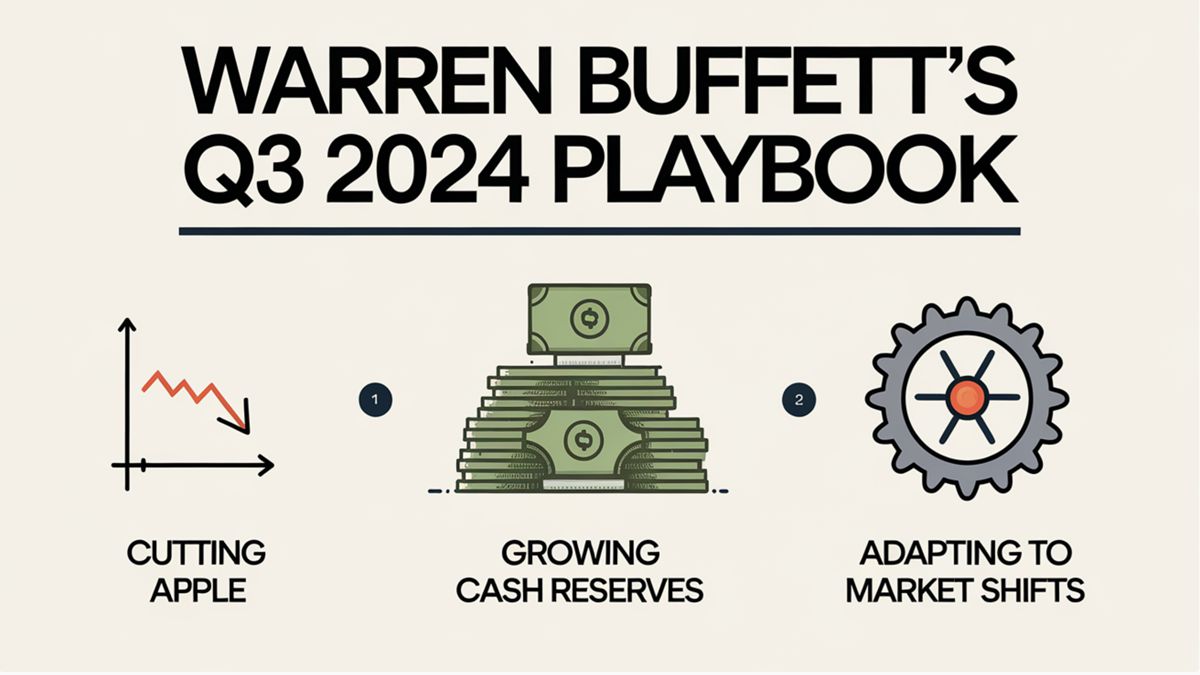Warren Buffett’s Q3 2024 Playbook: Cutting Apple, Growing Cash Reserves, and Adapting to Market Shifts

The Apple Conundrum: A Strategic Reduction
Apple Inc. has long been a cornerstone of Berkshire Hathaway’s equity portfolio, representing a significant portion of its holdings. However, in a surprising move, Buffett has been systematically reducing his stake in Apple over the past year. By the end of September 2024, Berkshire’s Apple holdings were valued at $69.9 billion, down from $84.2 billion in the previous quarter. This reduction marks a substantial 25% decrease, continuing a trend of divestment that has persisted for four consecutive quarters.
Why Sell Apple?
Buffett’s decision to trim his Apple stake has sparked widespread speculation. Several factors could be influencing this move:
- Valuation Concerns: Apple’s stock has experienced significant appreciation, and Buffett may perceive the current valuation as high relative to its intrinsic value. By selling a portion of the holdings, he could be capitalizing on these gains while managing portfolio risk.
- Tax Considerations: With potential changes in capital gains tax rates on the horizon, Buffett might be strategically selling to optimize tax liabilities. This proactive approach could mitigate future tax burdens, aligning with his long-term financial planning.
- Portfolio Diversification: Reducing the concentration in Apple allows Berkshire to diversify its portfolio further. This move aligns with Buffett’s philosophy of maintaining a balanced and diversified investment strategy to mitigate risks associated with over-reliance on a single asset.
Boosting the Cash Pile: A Fortress of Liquidity
As Buffett trims his equity positions, Berkshire Hathaway’s cash reserves have soared to unprecedented levels. By the end of the third quarter, the company’s cash pile reached a record $325.2 billion, marking a significant increase from previous quarters. This accumulation of cash reflects Buffett’s cautious approach to capital allocation in the current market environment.
The Significance of Cash
Holding a substantial cash reserve provides Berkshire with several strategic advantages:
- Flexibility for Future Opportunities: With a robust cash position, Berkshire is well-positioned to seize attractive investment opportunities as they arise. This flexibility allows Buffett to act decisively when market conditions become more favorable.
- Risk Mitigation: In times of economic uncertainty and market volatility, a strong cash reserve acts as a buffer against potential downturns. It provides stability and ensures that Berkshire can weather financial storms without compromising its long-term objectives.
- Strategic Acquisitions: Buffett has historically favored acquiring businesses with strong fundamentals and competitive advantages. The cash pile equips Berkshire with the financial muscle to pursue strategic acquisitions that align with its investment philosophy.
Navigating Market Dynamics: A Cautious Approach
Buffett’s recent actions reflect a cautious approach to the current market dynamics. The S&P 500 has experienced significant gains, with a year-to-date increase of around 20%. However, Buffett has expressed concerns about the market’s “casino-like behavior” and rising stock valuations, as indicated by the S&P 500 Shiller CAPE ratio surpassing 35.
A Strategic Pause on Buybacks
In light of these market conditions, Berkshire paused its stock buyback program during the third quarter. This decision aligns with Buffett’s principle of repurchasing shares only when they are trading below intrinsic value. With Berkshire’s share price surging to record highs, the pause on buybacks reflects a disciplined approach to capital allocation.
Top Holdings: A Snapshot of Berkshire’s Portfolio
Despite the reduction in Apple holdings, Berkshire Hathaway’s equity portfolio remains concentrated in a few key stocks. As of the third quarter of 2024, approximately 70% of the portfolio is concentrated in five main holdings:
- Apple: Despite the reduction, Apple remains Berkshire’s largest holding, valued at $69.9 billion.
- American Express: Now the second-largest holding, valued at $41.1 billion, surpassing Bank of America.
- Bank of America: A significant reduction in holdings, with the stake now just under 10%.
- Coca-Cola: A long-time favorite, valued at $28.7 billion, with steady performance.
- Chevron: An energy sector investment, valued at $17.5 billion, reflecting modest gains.
Conclusion: A Forward-Looking Perspective
Warren Buffett’s recent strategic moves underscore his commitment to long-term value investing and prudent capital management. By reducing exposure to high-valuation stocks like Apple and bolstering cash reserves, Buffett is positioning Berkshire Hathaway to navigate the complexities of the current market environment.
For individual investors, Buffett’s actions offer valuable lessons in risk management, diversification, and the importance of maintaining liquidity. As the market continues to evolve, staying informed and adaptable will be key to achieving sustainable investment success.
In conclusion, while Buffett’s strategies may seem conservative to some, they reflect a deep understanding of market cycles and a steadfast commitment to preserving and growing wealth over the long term. As always, investors would do well to heed the wisdom of the Oracle of Omaha and consider how these principles can be applied to their own investment journeys.
Get Ahead with Pro Access:
Discover the strategies of top superinvestors and gurus with exclusive insights into their latest moves. Pro users can also access unique features like Congress Trades, Holdings of Leading Investors, and Social Media Trending Stocks, offering a complete picture of influential market trends.
Upgrade now to stay on top of insider insights and make smarter investment decisions. Subscribe here to elevate your investing experience with a Pro membership!


